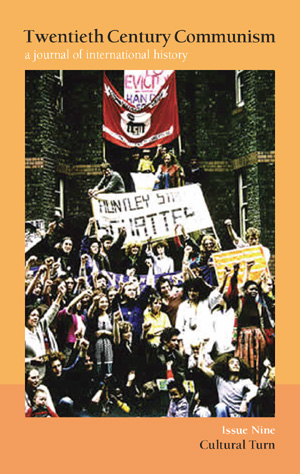
Editorial: Cultural Turn
Twentieth Century Communism - Print ISSN 1758-6437 - Online ISSN 2978-1329
Volume 2015 Number 9
Editorial: Cultural Turn
Matthew Worley
Abstract
The term ‘cultural turn’ is generally associated with a shift in leftist, socialist and communist politics after 1956. The upheavals of that year – primarily Soviet intervention in Hungary and Nikita Khrushchev’s revelation of the atrocities committed by Stalin – triggered realignments on the left, both within and without of the communist movement. At the very least, the Soviet Union’s claim to a scientifically rigorous interpretation of marxism was damaged. More accurately, the Soviets’ position as a revolutionary exemplar – a workers’ state building towards a progressive, democratic socialism on the foundations of marxist theory – was effectively undermined. As is well-known, there followed a period of rancour and division across the communist movement. Splits and soul-searching competed with blinkered intransigence and engrained loyalties too deep-rooted to expunge. New guides and approaches were sought: marxist thinkers from the past were dusted off and re-assessed; new theories were forged that ostensibly grew from Marx but often strayed so far as to break away into -isms of varying hue and relevance. The ‘new’ became ‘post’ as certainties dissolved into a vista of subjectivities.
To cite this article
Matthew Worley (2015) Editorial: Cultural Turn, Twentieth Century Communism, 2015(9)
